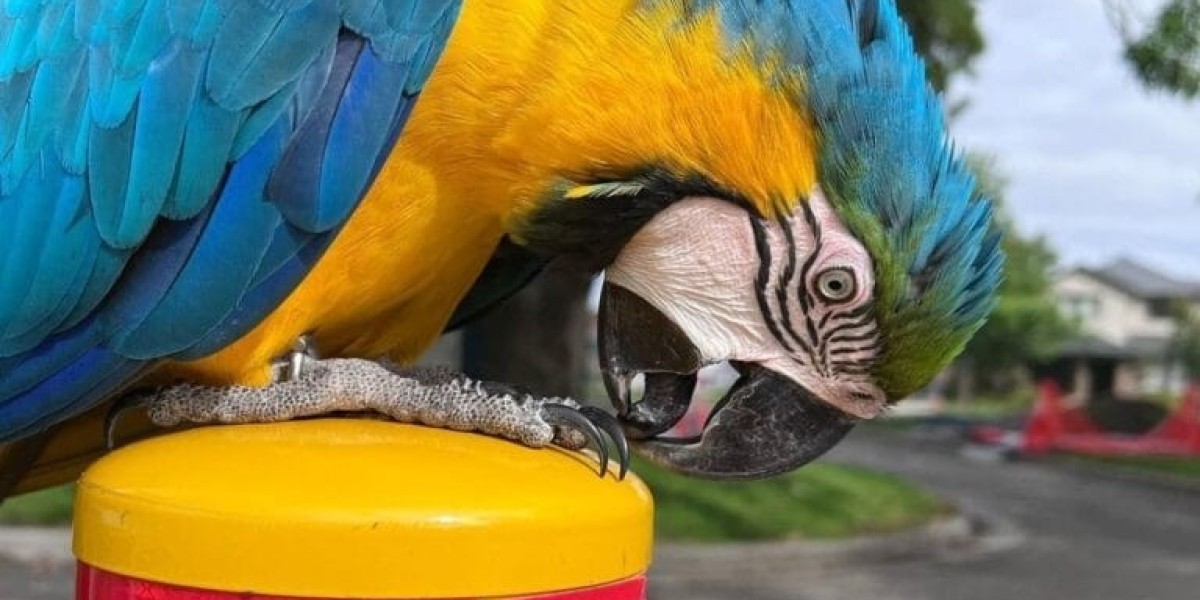Macaws are among the most striking and captivating parrots in the world, known for their vibrant colors, impressive size, and engaging personalities. If you're considering bringing a macaw into your home, it's important to understand the responsibilities and considerations involved. This guide will provide you with essential information about macaws, where to find them for sale, and how to ensure you can provide the best possible care for these magnificent birds.
Introduction to Macaws
Macaws are large parrots native to Central and South America. They are part of the family Psittacidae and are known for their long tails, strong beaks, and colorful plumage. There are several species of macaws, including the Blue and Gold Macaw, Scarlet Macaw, Green-Winged Macaw, and Hyacinth Macaw, each with its own unique characteristics and requirements.
1. Blue and Gold Macaw (Ara ararauna):
- Appearance: Bright blue and yellow feathers with a green forehead and black facial patches.
- Size: 30-34 inches in length, with a wingspan of about 40-48 inches.
- Lifespan: 30-50 years in captivity.
2. Scarlet Macaw (Ara macao):
- Appearance: Predominantly red with yellow and blue wing feathers.
- Size: 32-36 inches in length, with a wingspan of about 42-48 inches.
- Lifespan: 40-50 years in captivity.
3. Green-Winged Macaw (Ara chloropterus):
- Appearance: Red body with green wing feathers and blue tips.
- Size: 35-40 inches in length, with a wingspan of about 45-50 inches.
- Lifespan: 60-80 years in captivity.
4. Hyacinth Macaw (Anodorhynchus hyacinthinus):
- Appearance: Deep blue feathers with a distinctive yellow ring around the eyes and beak.
- Size: 3.3 feet in length, with a wingspan of about 4.5 feet.
- Lifespan: 50-60 years in captivity.
Where to Find a Macaw for Sale
Before purchasing a macaw, it's crucial to do thorough research and choose a reputable source. Here are some options:
**1. Avian Breeders and Breeders' Websites:
- Pros: Breeders often have a wide selection of macaw species and Buy-Macaw.Com can provide detailed information about the bird's lineage, health, and care.
- Cons: Prices can be higher, and you need to ensure the breeder is ethical and follows good breeding practices.
**2. Pet Stores:
- Pros: Convenient and often have a variety of birds available.
- Cons: The bird's background may be unclear, and pet stores may not have the expertise to provide detailed care instructions.
**3. Rescue Organizations and Adoption Centers:

- Pros: You can give a home to a bird in need, and rescue organizations often provide support and resources for new owners.
- Cons: Availability may be limited, and the bird may have behavioral or health issues.
**4. Online Marketplaces and Forums:
- Pros: Access to a wide network of sellers and potential adopters.
- Cons: Be cautious about scams and ensure the seller is reputable and provides proper documentation.
Considerations Before Buying a Macaw
Commitment and Time:
- Macaws are highly social and require a significant amount of daily interaction and attention. They can live for several decades, so this is a long-term commitment.
Space and Environment:
- Macaws need a large cage and plenty of room to fly and exercise. The cage should be at least 3 feet wide, 4 feet tall, and 2 feet deep, but larger is always better.
- Ensure your home can accommodate the noise and mess that come with owning a macaw.
Diet and Nutrition:
- Macaws require a balanced diet that includes a variety of fruits, vegetables, nuts, and commercial pelleted food. Avoid foods high in fat and sugar.
- Consult with an avian veterinarian to create a nutrition plan suitable for your macaw.
Health and Veterinary Care:
- Regular vet check-ups are essential. Find a veterinarian who specializes in avian care.
- Macaws are susceptible to certain diseases, such as psittacine beak and feather disease (PBFD) and avian influenza.
Behavior and Training:
- Macaws are intelligent and can be trained to perform tricks and follow commands.
- They can also be noisy and may develop behavioral issues if not properly socialized and cared for.
Cost:
- Macaws are expensive to purchase and maintain. The initial cost can range from £1,000 to £10,000, depending on the species and age.
- Additional expenses include cage, food, toys, veterinary care, and potential damage to furniture and household items.
Caring for Your Macaw
Cage Setup:
- Place the cage in a quiet, well-lit area away from drafts and direct sunlight.
- Include perches of varying diameters to promote foot health.
- Provide a variety of toys to keep your macaw mentally stimulated.
Feeding:
- Offer a mix of fresh fruits and vegetables, nuts, and pelleted food.
- Avoid avocados, chocolate, and caffeine, as these are toxic to birds.
Social Interaction:
- Spend at least 2-3 hours per day interacting with your macaw.
- Engage in activities like playing, training, and talking to build a strong bond.
Exercise and Enrichment:
- Allow your macaw to fly and explore outside the cage in a safe environment.
- Rotate toys and introduce new activities to prevent boredom and encourage mental stimulation.
Grooming:
- Regularly clip your macaw's wings to prevent flight and ensure safety.
- Bathe your macaw weekly to keep its feathers clean and healthy.
- Trim nails and beak as needed, or consult a vet for this task.
Health Monitoring:
- Observe your macaw for signs of illness, such as changes in appetite, behavior, or droppings.
- Schedule regular veterinary check-ups to ensure your bird remains healthy.
Owning a macaw is a rewarding but challenging experience. These birds are not just pets; they are family members who require a significant amount of care, attention, and love. If you are prepared to meet their needs and can provide a suitable environment, a macaw can bring joy and companionship to your life for many years to come. Always choose a reputable source for your macaw, and don't hesitate to seek advice from avian experts and veterinarians to ensure you are providing the best possible care for your feathered friend.








